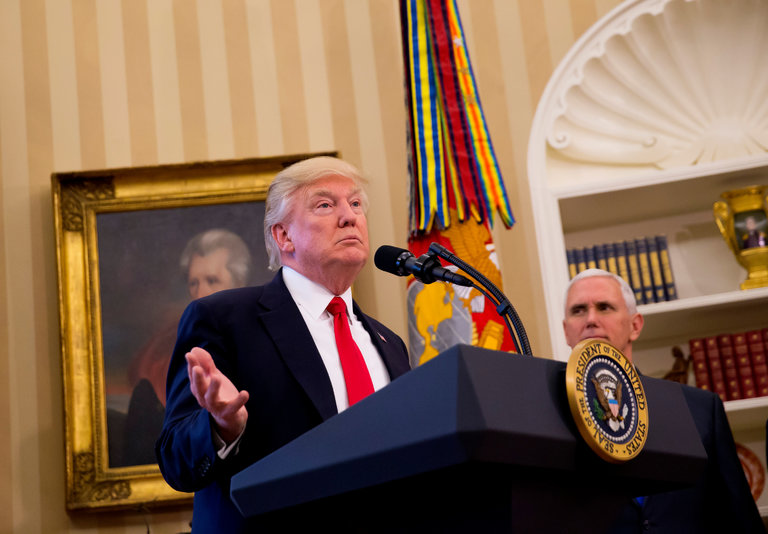During the campaign, Donald Trump talked loudly and often about how he was going to renegotiate America’s “horrible trade deals,” bringing back millions of good jobs. So far, however, nothing has happened. Not only is Trumpist trade policy — Trumptrade? — nowhere to be seen in practice; there isn’t even any indication of what it will involve.
So on Friday the White House scheduled a ceremony in which Mr. Trump would sign two new executive orders on trade. The goal, presumably, was to counteract the growing impression that his bombast on trade was sound and fury signifying nothing.
Unfortunately, the executive orders in question were, to use the technical term, nothingburgers. One called for a report on the causes of the trade deficit; wait, they’re just starting to study the issue? The other addressed some minor issues of tariff collection, and its content apparently duplicated an act President Obama already signed last year.
Not surprisingly, reporters at the event questioned the president, not about trade, but about Michael Flynn and the Russia connection. Mr. Trump then walked out of the room — without signing the orders. (Vice President Mike Pence gathered them up, and the White House claims that they were signed later.)
The fiasco perfectly encapsulated what’s looking more and more like a failed agenda.
Business seems to have decided that Mr. Trump is a paper tiger on trade: The flow of corporate relocations to Mexico, which slowed briefly while C.E.O.s tried to curry favor with the new president, has resumed. Trade policy by tweet, it appears, has run its course.

President Trump before signing two executive orders in the Oval Office on Friday. Credit Eric Thayer for The New York Times
Investors seem to have reached the same conclusion: The Mexican peso plunged 16 percent after the election, but since Inauguration Day it has recovered almost all the lost ground.
Oh, and last week a draft proposal for revising the North American Free Trade Agreement circulated around Congress; instead of sweeping changes in what candidate Trump called the “worst trade deal” ever signed, the administration appears to be seeking only modest tweaks.
This surely isn’t what working-class Trump supporters thought they were voting for. So why can Trumpist trade policy be summarized — to quote The Times’s Binyamin Appelbaum — as “talk loudly and carry a small stick”? Let me give two reasons.
First, back when Mr. Trump was railing against trade deals, he had no idea what he was talking about. (I know, you’re shocked to hear that.)
For example, listening to the Tweeter-in-chief, you’d think that Nafta was a big giveaway by the United States, which got nothing in return. In fact, Mexico drastically cut its tariffs on goods imported from the U.S., in return for much smaller cuts on the U.S. side.
Or take Mr. Trump’s repeated claims that China gains a competitive advantage by manipulating its currency. That was true six years ago, but it’s not true now. These days China is actually intervening to keep its currency up, not down.
Talking nonsense about trade didn’t hurt Mr. Trump during the campaign. But now he’s finding out that those grossly unfair trade deals he promised to renegotiate aren’t all that unfair, after all, leaving him with no idea what to do next.

